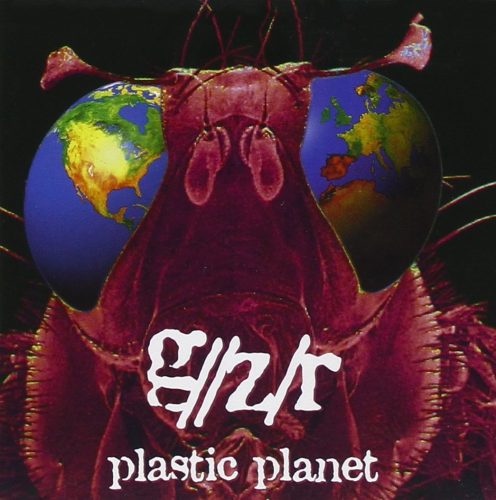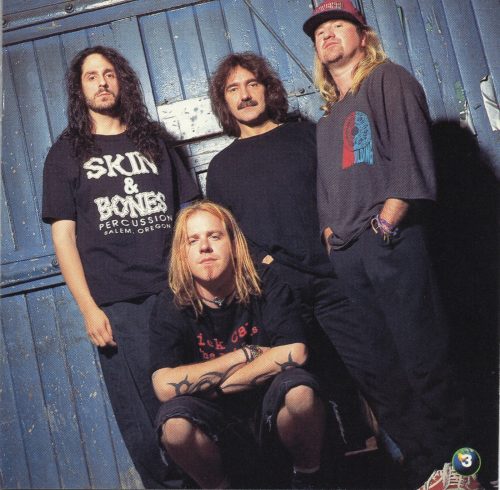Cast your minds back to a time when metal music was not cool. Nay, indeed, a time when metal was anathema to all that was considered to be “chic” and “in.” A time when your favorite bands were actually encouraged by the music industry to play slower, cut their hair, and write sensitive lyrics about their childhoods. Yes, this unfortunately really happened.
Our semi-irregular feature “90s Metal Weirdness” focuses on albums released between 1992 and 2001 and which we all probably would rather forget. But in the service of publicly shaming the musicians involved, we have pushed forward. — AMG
G/Z/R: Plastic Planet (1995)
 The Back Story: Not even legendary bassist Geezer Butler was immune to the exotic charms of 90’s Metal Weirdness. Fresh off one of his many hiatuses from Black Sabbath, Butler conceived a new project, based upon a heavier, more modern style of metal. For this new endeavor, he recruited drummer Deen Castronovo (the two had recently collaborated on Ozzy Osbourne’s Ozzmosis album), and his nephew Pedro Howse on guitar.
The Back Story: Not even legendary bassist Geezer Butler was immune to the exotic charms of 90’s Metal Weirdness. Fresh off one of his many hiatuses from Black Sabbath, Butler conceived a new project, based upon a heavier, more modern style of metal. For this new endeavor, he recruited drummer Deen Castronovo (the two had recently collaborated on Ozzy Osbourne’s Ozzmosis album), and his nephew Pedro Howse on guitar.
Given that the new band was influenced considerably by Fear Factory, it made sense to recruit a vocalist directly from the source. Vocals on Plastic Planet were performed by Burton C. Bell, who had just finished recording a little album called Demanufacture.
What Does It Sound Like: Above-average groove/modern metal, with occasional bursts of really cool bass playing. Fear Factory and Pantera are obvious reference points; there are occasional textures that recall Ministry’s heavier moments as well. At the time, I was pretty shocked that an old-schooler like Butler would be involved in a record this abrasive.
Opener “Catatonic Eclipse” sets the tone with some vaguely progressive, keyboard-accented groove metal, while first single “Drive Boy Shooting” is an almost-industrial slogfest. The title track features near-hardcore riffage, a powerhouse performance by Castronovo, and Butler’s trademark walking basslines. “Seance Fiction” is more on the doom side, and would have made an excellent Sabbath track. The sparse, acoustic “Cycle of Sixty” closes the album on a haunting note, tarnished only by some absolutely terrible singing (subtlety was never Bell’s thing).
Awkward Personal or Political Lyrics? Only a fool would underestimate Butler’s lyrical prowess, considering that he wrote nearly every word on the first eight Sabbath discs. A lot of Plastic Planet seems to explore technological or sci-fi themes, not far removed from the subject matter on Sabbath’s Dehumanizer album. This occasionally results in some terminology that has not aged well (cyberspace!), but the overall dystopian vibe is conveyed very clearly.
Social issues are tackled on “Drive Boy Shooting” and “The Invisible,” while “House Of Clouds” seems to address mental illness. “Giving Up The Ghost” lashes out at Tony Iommi for refusing to pull the plug on Sabbath, and somehow works in a reference to the Rosanna Arquette film Desperately Seeking Susan as well. Oh, and “Detective 27” is awesome in spite of (because of?) literally being a song about Batman.
Were Haircuts Involved? Butler may have upgraded his sound for the alt-metal era, but visually, he would make no such compromise. Much to his credit, his long hair and porno mustache would remain intact for the rest of the 20th century. The other three guys could be from any R.I.P. magazine band photo circa the mid-1990s.

How Bad Was It Really? I can honestly rank this album above all of Fear Factory’s output except Demanufacture (OK, maybe Obsolete too). It also kicks the living shit out of Black Sabbath’s Geezer-less Forbidden record, which came out around the same time. Plastic Planet is very much of its era, but manages to incorporate a lot of 90’s Metal’s strengths and few of its weaknesses. The album’s mix, by Paul Northfield (Rush, Queensryche), has also aged pretty well compared to most metal albums from 1995.
The Aftermath: The original G/Z/R lineup didn’t do much to support Plastic Planet. Bell obviously had business to tend to with Fear Factory, and Butler made nice with Tony Iommi in time for Sabbath’s 1997 reunion. Castronovo eventually enjoyed a lengthy tenure with Journey, but lost that gig after being arrested for assault in June 2015.
Butler and Howse continued to make records under the G/Z/R name (or some variation thereof) occasionally. Vocalist Clark Brown replaced Bell for Black Science (1997) and Ohmwork (2005). Butler has mostly been focused on Black Sabbath since then, but with that band’s farewell tour coming to a close, could a G/Z/R resurgence be in the cards? Only time will tell.

















